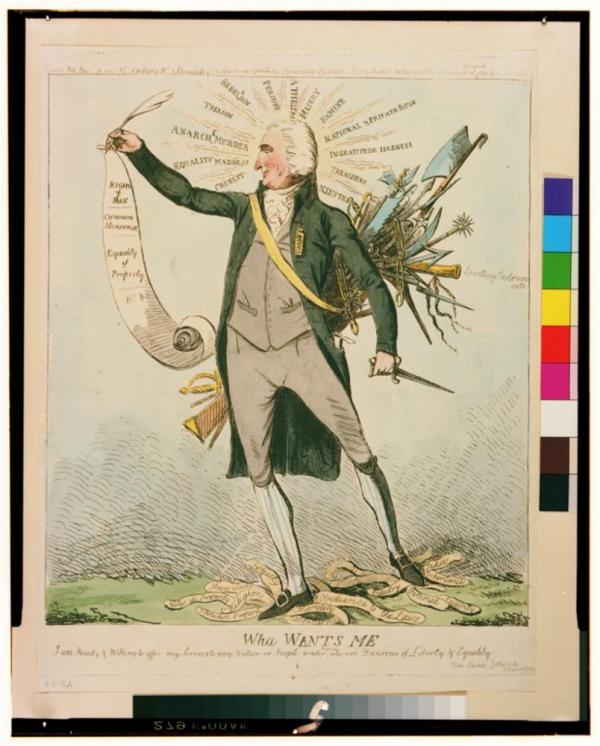Religion and Revolution
EDSITEment examines the religious underpinnings of the American Revolution

A British cartoon of 1792 depicts Thomas Paine ready to defend liberty.
Credit: Library of Congress

A British cartoon of 1792 depicts Thomas Paine ready to defend liberty.
Credit: Library of Congress
While most people credit the growing colonial resistance to the British Empire to philosophical and political motivations, many scholars argue that the effects of religion must also be considered for a complete understanding of the American Revolution. It is only by comprehending the influence of religious principles, these scholars insist, that one can fully explain why the cause of republicanism attracted the attention of so many ordinary Americans.
In the minds of many American revolutionaries, including John Adams, resistance to political tyranny was consistent with obedience to God, as described retrospectively in Adams’1818 letter to American editor Hezekiah Niles.
In fact, the colonials’ religious situation is what led Edmund Burke, an eighteenth-century pro-American member of the English Parliament, to say that “[t]he religion most prevalent in our northern colonies is a refinement of the principle of resistance: it is the dissidence of dissent, and the Protestantism of the Protestant religion” – thus emphasizing that the American independence movement was in accordance with the colonists’ religious beliefs.
EDSITEment’s online lesson, “Religion and the Argument for American Independence,” indicates that whereas religion may not have been the source of all the philosophical and intellectual ideals that fueled the American Revolution, many revolutionaries turned to it for its animating and energizing potential as well as its affirmation of the principles of liberty and independence.
Some scholars consider the First Great Awakening, a religious revitalization movement that swept through the American colonies (and Protestant countries in Europe) in the early eighteenth-century, as a sort of “dress rehearsal” for the American Revolution. Swept up in evangelical revivals that emphasized individual personal commitment, many American men and women found themselves questioning and defying traditional authorities that no longer served their needs – an analogous impetus to later rebellion against other existing power hierarchies.
Moreover, Thomas Paine, while not a religious man himself, turned to religious rhetoric in Common Sense, his popular pamphlet outlining his arguments for breaking with the British Empire, because he recognized that the religious appeal would spur his readers to political action.
Learn more about religion and the American Revolution through the EDSITEment lesson plan specially designed for high school teachers eager to encourage critical thought and study regarding this important aspect of United States history. The lesson plan features a number of essential primary sources as well as links to pertinent, reviewed websites.
To access the relevant EDSITEment lesson plan, click here.